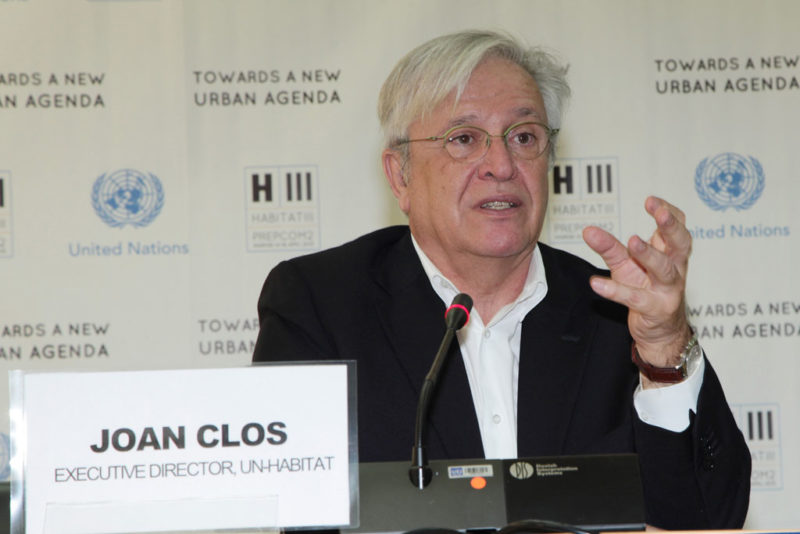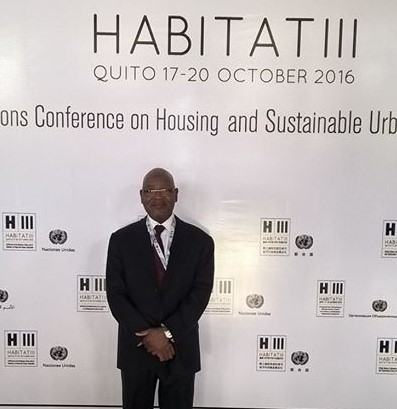The United Nations Conference on Housing and Sustainable Urban Development, known as Habitat III, was on Thursday wrapped up in Quito, Ecuador, with delegations adopting a new framework that will set the world on a course towards sustainable urban development by rethinking how cities are planned, managed and inhabited.

“We have analysed and discussed the challenges that our cities are facing and have (agreed) on a common roadmap for the 20 years to come,” Joan Clos, the Executive Director of the UN Human Settlements Programme (UN-Habitat), told the closing plenary of the conference, which has drawn around 36,000 people from 167 different countries to the lush equatorial capital of Quito for the past six days.
He said that the action-oriented outcome document, known as the New Urban Agenda, enshrined now in the “Quito Declaration on Sustainable Cities and Human Settlements for All,” should be seen as an extension of the 2030 Agenda for Sustainable Development, agreed by 193 Member States of the UN in September 2015.

That Agenda’s 17 Sustainable Development Goals (SDGs) recognised the power of cities and towns, which will constitute up to 70 per cent of the world population by 2050, to be the engine for sustainable growth in the future.
Habitat III, major conference on the future of the world’s cities and towns, brought together mayors, local and regional authorities, civil society and community groups, and urban planners. Mayors said the conference advanced the participation of local authorities in the global effort to achieve the SDGs.
Dennis Codere, Mayor of Montreal, said: “We know that without the involvement of cities and local governments, the world will not be able to address the global challenges of our times.
‘New Urban Agenda’ for green, clean, inclusive cities
“The New Urban Agenda is an ambitious agenda which aims at paving the way towards making cities and human settlements more inclusive,” said Mr. Clos, who also served as the Secretary-General of the Conference, adding that it would ensure “everyone can benefit from urbanisation, paying particular attention to those in those in vulnerable situations.”
The Agenda stresses that tackling air pollution in cities is good both for people’s health and for the planet and through it, leaders have committed to increase their use of renewable energy, provide better and greener public transport, and sustainably manage their natural resources. The Agenda’s ‘shared vision’ aims to create conditions for communities and policy makers to create that are engines of sustained and inclusive economic growth, social and cultural development, and environmental protection.
Among the key provisions are a call for equal opportunities for all; an end to discrimination; cleaner cities; strengthening resilience and reducing carbon emissions; fully respecting the rights of migrants and refugees regardless of their status; improving connectivity and green initiatives, and promoting “safe accessible and green public spaces.”
Above all, he said, it was a “commitment that we will all together take the responsibility of one another and the direction of the development of our common urbanising world.”
The agenda does not bind Member States or city governments to specific targets or goals, but is rather a “shared vision” that set standards for transforming urban areas into safer, resilient and more sustainable places, based on better planning and development.
In signing onto the declaration, UN Member States are committing to action over the next 20 years, to improve all areas of urban life through the Quito Implementation Plan, in support of the outcomes of Habitat III and the New Urban Agenda.
Mr. Clos reminded the world gathering of national leaders; Mayors, civil society representatives; non-governmental organisations (NGOs), urban development experts, and other stakeholders that “we must act for these commitments.”
In an interview with the UN News Service to mark the end of Habitat III, Mr. Clos said the hard work of making the New Urban Agenda a reality needs to begin immediately. “If we don’t implement, it’s going to be useless,” he stressed.
The conference had helped establish “who needs to do what. This is the real question (…) What the conference is saying is there’s a need to walk back to the fundamentals of urbanisation,” he added.
“I encourage national, sub-national and local governments to use the New Urban Agenda as a key instrument for planning and policy development for sustainable urbanisation,” he said, in his remarks during the closing plenary, adding that national reports were already being sent to the Habitat III Secretariat, prepared by governments, “some of which have been delivered to us at this conference.”
The Quito Declaration lays out steps for action, and for government accountability to try and ensure that the New Urban Agenda becomes a reality.
An “evidence-based and independent assessment” of UN-Habitat is due to take place next year under the auspices of the UN Secretary-General, and a two-day High Level Meeting of the General Assembly is being convened by assembly President, Peter Thomson, to discuss effective implementation.
